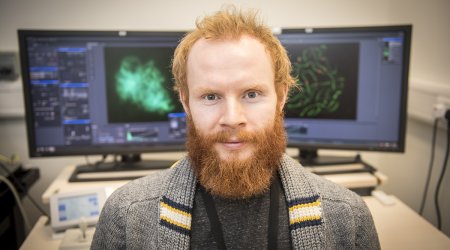Early-career microbiologist awarded prestigious Royal Commission 1851 Fellowship

An outstanding early-career researcher has been awarded a prestigious fellowship to take forward research into the global threat posed by antibiotic resistant bacteria.
Dr Emma Banks, a molecular microbiologist at the John Innes Centre receives the Royal Commission for the Exhibition of 1851 Research Fellowship.
Around eight of these prestigious Fellowships are made each year to give promising early career scientists from all fields of science the opportunity to conduct their own research project.
“I was stunned and absolutely thrilled as this fellowship is so competitive,” said Emma. “This is an incredibly exciting point in my career as it allows me to take the first big step towards scientific independence and hopefully starting my own research group in the future.”
Emma joined Dr Tung Le’s group at the John Innes Centre in March 2022 after completing her PhD on predatory bacteria at the University of Nottingham.
Dr Tung Le said: “This award is a great compliment to Emma. The Royal Commission for the Exhibition of 1851 fellowship is highly prestigious and competitive. It is very impressive that her proposal was developed almost entirely by Emma and it will allow her to test her research ideas and hypotheses, guiding her toward the goal of establishing an independent research group.”
With this Fellowship Emma will be able to continue her research for three years with a project titled, “Illuminating the mechanistic basis of virus-like gene transfer between bacteria”.
The underlying aim of the project is to understand the fundamental biology of gene transfer agents (GTAs).
These virus-like particles found inside genomes of bacteria can “move” DNA between bacterial cells. This means that they can spread genes that confer resistance to antibiotics.
Accordingly, GTAs contribute to antibiotic resistance, – a global crisis that we are currently facing. Despite their importance, we know extremely little about how GTAs work.
“Investigating GTAs presents an exciting opportunity to study fascinating novel biology and better understand how GTAs contribute to antibiotic resistance,” says Emma.
“It is also possible that we could harness this newfound knowledge to potentially engineer synthetic GTA particles for use as new genetic tools and as novel therapeutics to kill bad bacteria.”
Emma thanked those who had supported her career so far including her PhD supervisors Professor Liz Sockett and Professor Andrew Lovering from the Universities of Nottingham and Birmingham, and current supervisor Dr Tung Le. She also thanked the John Innes Centre for supporting her application and hosting this fellowship.
The Royal Commission for the Exhibition of 1851 was established in 1850 to organise the Great Exhibition at Crystal Palace, London. The Commission has been awarding fellowships and scholarships since 1891. Previous holders include 13 Nobel Laureates.



